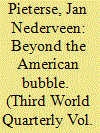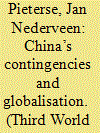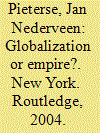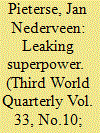| Srl | Item |
| 1 |
ID:
074908


|
|
|
|
|
| Publication |
2006.
|
| Summary/Abstract |
In the 21st century, does empire make sense? From the viewpoint of flexible and increasingly de-territorialised capitalism, does empire matter or is it a costly liability? Are the new wars an expression of US capitalism or do they reflect a US superpower syndrome and path dependence on the national security state? This paper takes the latter view and argues that the superpower syndrome is embedded in the American bubble. Civilian casualty rates in Iraq and Afghanistan are extraordinarily high. This occurs at the confluence of several trends: the USA seeking land power on a distant continent, the tendency to view countries as strategic real estate and the American bubble that leads Americans to underestimate resistance. In closing I draw a balance sheet of whether and how empire matters and briefly address the global realignments that are underway.
|
|
|
|
|
|
|
|
|
|
|
|
|
|
|
|
| 2 |
ID:
052945


|
|
|
|
|
| Publication |
Apr-Jun 2004.
|
| Summary/Abstract |
While pursuing number one status the United States has become an authoritarian, conservative and culturally backward society. Afflicted with a declining economy, the country is clearly headed in the wrong direction
|
|
|
|
|
|
|
|
|
|
|
|
|
|
|
|
| 3 |
ID:
143551


|
|
|
|
|
| Summary/Abstract |
Will China be able to rebalance its economy, heavily tilted towards investment? Will it be able to increase the share of household consumption in GDP? Will it turn steeply growing social inequality around? Will urbanisation contribute to China’s rebalancing or will it add to the imbalances? Will China manage to bring pollution under control? Such variables will determine whether China can move beyond the middle-income trap and also affect its external relations. In addition, China’s rebalancing is a variable in global rebalancing. This article provides an introduction to the special issue.
|
|
|
|
|
|
|
|
|
|
|
|
|
|
|
|
| 4 |
ID:
047392


|
|
|
|
|
| Publication |
Lanham, Rowman & Littlefield Publishers, 2004.
|
| Description |
viii, 149p.
|
| Series |
Globalization
|
| Standard Number |
9780742528024
|
|
|
|
|
|
|
|
|
|
|
|
Copies: C:1/I:0,R:0,Q:0
Circulation
| Accession# | Call# | Current Location | Status | Policy | Location |
| 047089 | 303.48/PIE 047089 | Main | On Shelf | General | |
|
|
|
|
| 5 |
ID:
053557


|
|
|
|
|
| Publication |
New York, Routledge, 2004.
|
| Description |
xi, 196p.
|
| Standard Number |
0415948495
|
|
|
|
|
|
|
|
|
|
|
|
Copies: C:1/I:0,R:0,Q:0
Circulation
| Accession# | Call# | Current Location | Status | Policy | Location |
| 048568 | 327.730090511/PIE 048568 | Main | On Shelf | General | |
|
|
|
|
| 6 |
ID:
116835


|
|
|
|
|
| Publication |
2012.
|
| Summary/Abstract |
While US government agencies endorse and support the democratic potential of the internet and social media overseas, the criticisms of the WikiLeaks disclosures of US diplomatic cables reveal the bias in relation to transparency and democracy. This poses a wider problem of connectivity combined with hegemony. This paper discusses what the criticisms of the WikiLeaks disclosures reveal. After discussing the enthusiasm about 'hyper-connectivity', the paper turns to the WikiLeaks disclosures, and next spells out global ramifications of the leaked cables, the problems of transparency and hegemony, frictions between democracy and democratisation, and the role of banks blocking donations to WikiLeaks.
|
|
|
|
|
|
|
|
|
|
|
|
|
|
|
|